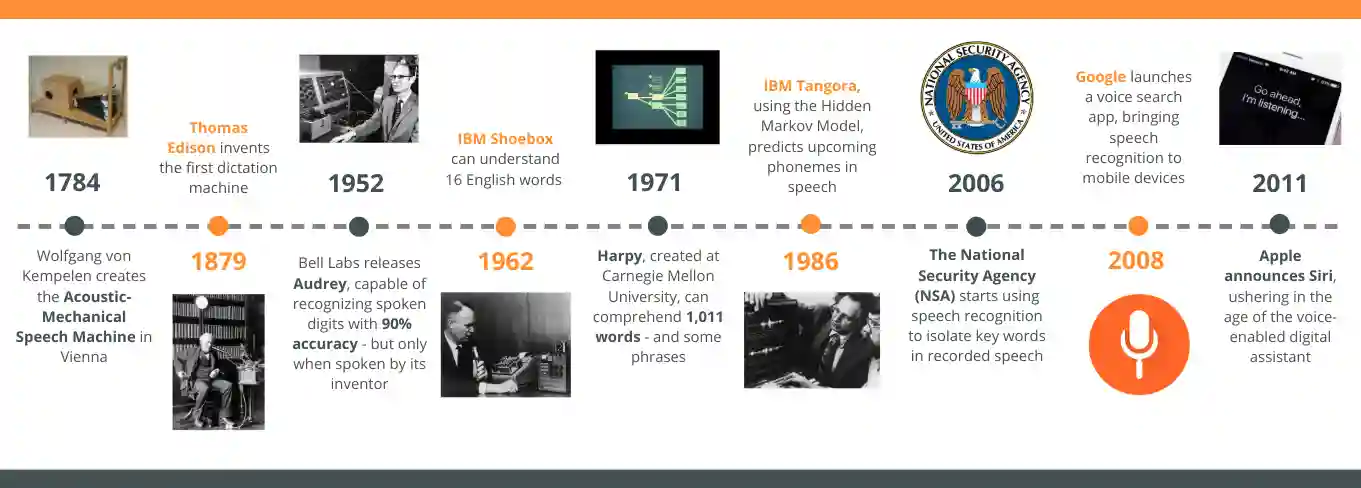Voice Search Impact on Digital Marketing
In recent years, the digital marketing landscape has undergone significant transformations due to advancements in technology. One of the most profound changes has been the rise of voice search. Voice search technology allows users to perform online searches by speaking directly into their devices, bypassing traditional text-based search methods. This shift has far-reaching implications for digital marketing strategies, consumer behavior, and the way businesses approach search engine optimization (SEO). This blog explores the impact of voice search on digital marketing, delving into its origins, growth, and the strategies businesses must adopt to stay competitive.

The digital landscape is constantly evolving, and the way users interact with search engines is no exception. The rise of voice search technology has fundamentally changed how people access information online, presenting both challenges and exciting opportunities for digital marketers. This comprehensive guide explores the impact of voice search on digital marketing, equipping you with the knowledge and strategies to thrive in this new era.
The Evolution of Voice Search

Voice search technology has evolved rapidly over the past decade. Initially introduced in the form of voice-activated assistants like Apple’s Siri, Google’s Assistant, Amazon’s Alexa, and Microsoft’s Cortana, it has become a mainstream method for searching the internet. The evolution of natural language processing (NLP) and artificial intelligence (AI) has significantly improved the accuracy and usability of voice search, making it a preferred choice for many users.
Here are some key characteristics of voice search:
- Conversational Language: Users phrase queries as questions, often using longer and more natural language compared to typed keywords. For instance, instead of typing “best pizza places near me,” they might ask, “Hey Google, what are the top-rated pizza restaurants close by?”
- Localised Focus: A significant portion of voice searches are location-based. People use voice search on mobile devices while on the go, seeking information about nearby businesses, restaurants, or events.
- Informational Intent: Voice search queries often focus on gathering information rather than navigating to specific websites. Users might ask for directions, business hours, or product details.
- Speed and Convenience: Voice search prioritizes speed and ease of use. Users expect quick answers, often in a single, concise response.
The Growth of Voice Search

The adoption of voice search has grown exponentially. According to recent statistics, over 55% of households are expected to own a smart speaker by 2022. Moreover, it is estimated that 50% of all online searches will be voice-based by 2023. This rapid growth can be attributed to the convenience and efficiency of voice search, as well as the increasing number of voice-activated devices in the market.
How Voice Search Works

Voice search operates on sophisticated AI algorithms and machine learning techniques. When a user speaks into a voice-activated device, the audio input is converted into text. This text is then processed using NLP to understand the context and intent of the query. The search engine retrieves the most relevant information and responds to the user, often in the form of a spoken answer. This seamless interaction mimics human conversation, providing users with quick and accurate results.
Impact on SEO and Digital Marketing

1. Shift to Natural Language
Voice search queries tend to be more conversational and natural compared to text-based searches. Users often ask complete questions rather than using fragmented keywords. For example, a text-based search might be “best Italian restaurant,” while a voice search would be “What is the best Italian restaurant near me?” This shift necessitates a change in SEO strategies, focusing on long-tail keywords and natural language phrases.
2. Importance of Featured Snippets
Featured snippets, also known as position zero, play a crucial role in voice search results. When users ask questions, voice assistants often read out the featured snippet. Therefore, optimizing content to appear in these snippets can significantly enhance visibility and drive traffic. This involves providing clear and concise answers to common questions within the content.
3. Local SEO
Voice search has a strong correlation with local search queries. Users frequently use voice search to find nearby businesses, services, or attractions. As a result, optimizing for local SEO has become more critical than ever. This includes ensuring that business listings are accurate, managing online reviews, and optimizing content for local keywords.
4. Mobile Optimization
Voice search is predominantly used on mobile devices. Hence, having a mobile-friendly website is essential for a successful voice search strategy. This includes responsive design, fast loading times, and easy navigation. Google’s mobile-first indexing also means that the mobile version of a website is considered the primary version, making mobile optimization crucial for SEO.
5. Structured Data and Schema Markup
Structured data and schema markup help search engines understand the content of a website better. By implementing schema markup, businesses can provide additional context about their content, making it easier for voice search algorithms to retrieve and present relevant information. This can improve the chances of appearing in voice search results.
Optimizing Your Digital Marketing Strategy for Voice Search
Now that we understand the impact of voice search, let’s delve into actionable strategies you can implement to optimize your digital marketing efforts:
- Keyword Research: Conduct thorough keyword research, focusing on long-tail keywords and natural language phrases relevant to your target audience. Utilize tools like Google Keyword Planner and Answer the Public to identify the questions users are asking about your products or services.
- Content Optimization: Revamp your content strategy to cater to voice search. Create informative, well-structured content that provides clear and concise answers to user queries. Break down complex topics into easily digestible chunks and leverage headings, subheadings, and bullet points to improve readability for voice assistants.
- Embrace Long-Tail Keywords: Long-tail keywords are more specific and provide a higher chance of ranking for voice searches. Integrate these keywords naturally throughout your website content, blog posts, and landing pages.
- Focus on Conversational Language: Write content that sounds natural and conversational. Use the same language people would use when asking questions. Avoid overly technical jargon and focus on clear, concise communication.
- Prioritize Featured Snippets: Optimize your content for featured snippets by answering common questions directly within your content. Target relevant long-tail keywords and aim to provide concise, informative answers within the featured snippet character limit.
- Embrace Local SEO: For brick-and-mortar businesses, local SEO is paramount. Claim and optimize your Google My Business profile, ensure consistent NAP citations across the web, and target local keywords to improve your visibility in voice search results for nearby users.
Impact on Content Marketing

The rise of voice search has also influenced content marketing strategies. Here are some key considerations:
1. Creating Conversational Content
Content should be written in a conversational tone, reflecting how people speak. This makes it more likely to align with voice search queries. Incorporating questions and answers within the content can also improve its relevance to voice searches.
2. Focusing on FAQs
Frequently Asked Questions (FAQs) are particularly effective for voice search optimization. Creating comprehensive FAQ sections that address common queries can enhance the chances of being featured in voice search results.
3. Emphasizing Local Content
For businesses targeting local customers, creating localized content is essential. This includes writing blog posts about local events, news, or community activities, which can attract voice search traffic.
Voice Search and User Experience
Voice search significantly enhances the user experience by providing quick and accurate answers. This convenience has led to changes in user behavior and expectations:
1. Speed and Efficiency
Users expect immediate results when using voice search. This means that websites must load quickly and provide direct answers to queries. Slow-loading pages or irrelevant content can lead to higher bounce rates and lower rankings.
2. Accessibility
Voice search is particularly beneficial for individuals with disabilities or those who have difficulty typing. It provides an accessible way to navigate the internet and find information, making it important for businesses to ensure their content is accessible to all users.
3. Personalization
Voice search can offer a more personalized experience by leveraging user data and preferences. For example, voice assistants can provide tailored recommendations based on past behavior or location. This level of personalization can improve customer satisfaction and loyalty.
Case Studies and Success Stories
To illustrate the impact of voice search on digital marketing, let’s explore some real-world examples:
1. Domino’s Pizza
Domino’s Pizza has embraced voice search by integrating their ordering system with Amazon Alexa and Google Assistant. Customers can place orders using voice commands, making the process seamless and convenient. This integration has not only enhanced the customer experience but also increased sales and customer retention.
2. Nestlé
Nestlé has optimized its content for voice search by focusing on natural language and providing detailed answers to common cooking-related questions. By targeting long-tail keywords and creating high-quality content, Nestlé has successfully increased its visibility in voice search results, driving more traffic to its website.
3. Johnnie Walker
Johnnie Walker created an interactive voice experience called “Whisky Expert” on Amazon Alexa. Users can ask questions about whisky, get recommendations, and even learn cocktail recipes. This innovative use of voice search technology has enhanced brand engagement and provided valuable information to consumers.
Future Trends and Predictions

As voice search continues to evolve, several trends are expected to shape its future impact on digital marketing:
1. Increased Adoption of Smart Speakers
The adoption of smart speakers is projected to rise, leading to more voice searches being conducted at home. This presents new opportunities for businesses to engage with consumers through voice-activated devices.
2. Integration with IoT Devices
Voice search will become increasingly integrated with Internet of Things (IoT) devices, allowing users to control various aspects of their homes and lives through voice commands. This will create new avenues for marketing and advertising.
3. Enhanced AI Capabilities
Advancements in AI and machine learning will further improve the accuracy and capabilities of voice search. Voice assistants will become more intuitive and capable of understanding complex queries, providing even more relevant responses.
4. Voice Commerce
Voice commerce, or v-commerce, is expected to grow as more consumers use voice search to make purchases. Businesses will need to optimize their e-commerce platforms for voice search to capitalize on this trend.
Conclusion
Voice search is transforming the digital marketing landscape, offering new opportunities and challenges for businesses. By understanding the nuances of voice search and adapting their strategies accordingly, businesses can enhance their visibility, improve user experience, and stay ahead of the competition. As technology continues to advance, the importance of voice search in digital marketing will only grow, making it essential for businesses to embrace this trend and leverage its potential to achieve success.
In this comprehensive exploration of voice search and its impact on digital marketing, we’ve covered its evolution, growth, and the strategic adjustments businesses need to make. As voice search becomes more prevalent, staying informed and proactive will be key to harnessing its full potential.






